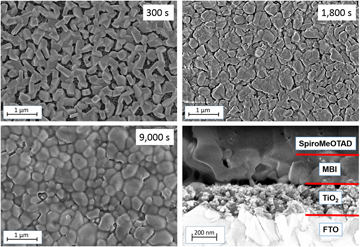Published online by Cambridge University Press: 06 February 2019

In the past years, numerous alternative cations to replace Pb2+ in perovskite solar cells have been investigated. In terms of toxicity and chemical stability, methylammonium bismuth iodide [(CH3NH3)3Bi2I9 or MBI] containing the Bi3+ cation has been considered as a promising material. However, fabrication of coherent MBI films remains challenging. Recently, significant progress has been achieved by using vapor deposition processes. Compared with solution-processed ones, vapor-deposited MBI solar cells show higher fill factors and efficiencies. In this work, chemical vapor deposition (CVD) of MBI is investigated. Employing nitrogen as carrier gas, the precursors bismuth iodide (BiI3) and methylammonium iodide (MAI) are deposited sequentially over several cycles and form MBI during the process. In order to form dense and coherent layers, the lengths of the deposition cycles as well as the substrate temperature have been optimized. Scanning electron microscopy reveals the strong influence of both parameters on growth and crystal properties. Optimized films of MBI integrated into solar cells show that CVD of MBI is a promising method for fabricating large-area solar cells.
To send this article to your Kindle, first ensure no-reply@cambridge.org is added to your Approved Personal Document E-mail List under your Personal Document Settings on the Manage Your Content and Devices page of your Amazon account. Then enter the ‘name’ part of your Kindle email address below. Find out more about sending to your Kindle. Find out more about saving to your Kindle.
Note you can select to save to either the @free.kindle.com or @kindle.com variations. ‘@free.kindle.com’ emails are free but can only be saved to your device when it is connected to wi-fi. ‘@kindle.com’ emails can be delivered even when you are not connected to wi-fi, but note that service fees apply.
Find out more about the Kindle Personal Document Service.
To save this article to your Dropbox account, please select one or more formats and confirm that you agree to abide by our usage policies. If this is the first time you used this feature, you will be asked to authorise Cambridge Core to connect with your Dropbox account. Find out more about saving content to Dropbox.
To save this article to your Google Drive account, please select one or more formats and confirm that you agree to abide by our usage policies. If this is the first time you used this feature, you will be asked to authorise Cambridge Core to connect with your Google Drive account. Find out more about saving content to Google Drive.